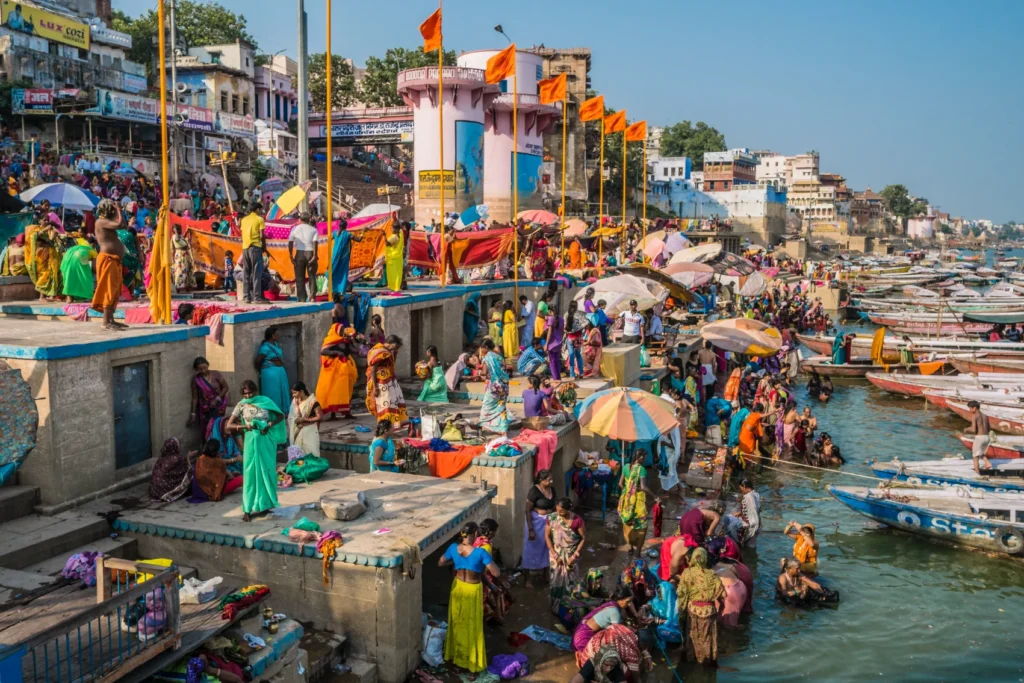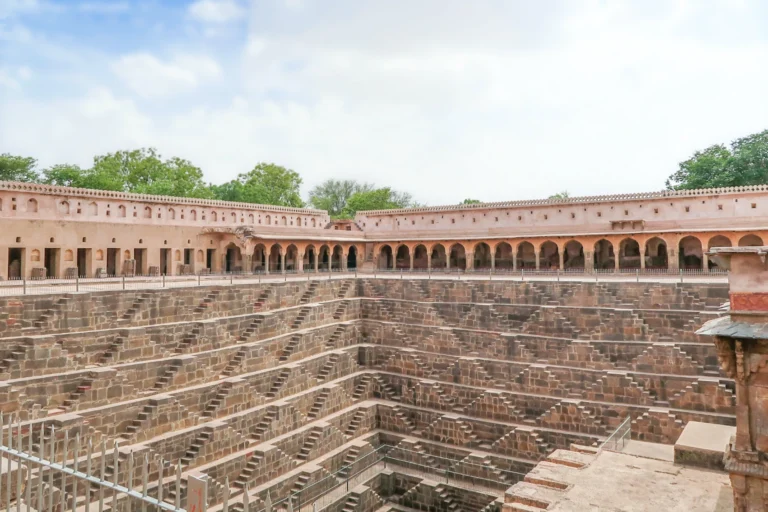
Nestled on the banks of the ethereal Ganges River and home to numerous religious sites, Varanasi is often considered the spiritual heart of India. With ancient rituals, vibrant festivals, world-famous ghats, and thousands of temples, it’s a captivating city that has attracted pilgrims and visitors for centuries.
A convergence of culture and enduring spirituality, Varanasi is one of the best places to visit in India, but it’s not just another destination to pass through and tick off your travel list. Rather, it’s a city that unfurls the more you seek to understand all its complex and distinctive parts. With that in mind, we’ve put together a list of the top things to do in Varanasi, as well as important facts about each one to help you connect with this once-in-a-lifetime place on a deeper level.
Experience Dashashwamedh Ghat’s energy
Dashashwamedh Ghat is one of Varanasi’s most beautiful and well-known ghats, steps that people use to worship on or access the river. This ghat is famous for its nightly ceremony, the Ganga aarti (more about this later). To reach the ghat, take a taxi or rickshaw toward the old city area and then walk, enjoying the aromas of Indian street food along the way.
Interesting fact: Dashashwamedh Ghat’s name means “the place where 10 horses were sacrificed,” a reference to one of the Hindu legends associated with this site.

Experience it for yourself on: India Encompassed
Be moved by an evening aarti ceremony
Make your way through meandering streets and plumes of steam from street food vendors to Dashashwamedh Ghat just before sunset, and you’ll be just in time to witness one of Varanasi’s highlights, an aarti ceremony. Pilgrims and visitors from all over the world gather every day to witness this deeply spiritual event, which combines fire, incense, chanting, and sacred objects. Priests carry out the ritual with synchronized movements, hymns, bells, and mantras to glorify the goddess Ganga.
Interesting fact: Part of the aarti ceremony involves the use of multi-tiered brass lamps that emit fire when swung, which represents one of the five elements: fire, earth, water, space, and wind.
Experience it for yourself on: Rajasthan & Varanasi — Ancient Temples & the Taj Mahal
Discover history at Ramnagar Fort
Ramnagar Fort is a crumbling yet beautiful sandstone structure that dates from the 18th century. Built by Kashi Naresh Raja Balwant Singh, it’s an example of Mughal and Rajput architecture. The fort is a lesser-known and somewhat neglected attraction, but its rundown state offers a snapshot into the past if you enjoy history without a filter. Wander through the courtyard and gates and then check out the museum, which showcases the regal lifestyle of the Kashi Naresh dynasty. Look for old manuscripts, pistols, royal costumes, and even some dusty vintage cars.
Interesting fact: Ramnagar Fort is home to an unusual clock. Its hands have been turning since 1852, and it shows the time, day, year, month, and even some astronomical facts.
Visit the sacred grounds of Sarnath
Northeast of Varanasi is Sarnath, a significant Buddhist site believed to be the place where the Buddha taught his first sermon. It’s home to the ruins of ancient monasteries and the Chaukhandi Stupa, which dates from the 5th century AD. Head to the archaeological museum to find antiquities excavated from the Sarnath site, as well as Buddhist art and artifacts. You can also see a collection of sculptures from the Gupta, Kushana, and Mauryan periods and images of Hindu gods.
Interesting fact: As you explore the museum, you may glimpse a familiar sight. The sandstone capital of the Ashoka Pillar, which contains a lotus flower and lions, is now the national emblem of India.
See it for yourself on: Essential India
Stand in awe of the Dhamek Stupa
Before wrapping up your trip to Sarnath, visit the Dhamek Stupa. Located at the spot where the Buddha is believed to have preached to his first five disciples, it’s one of the most significant Buddhist monuments in India. Standing about 43m (141 ft) high, the imposing structure is a defining feature of the peaceful gardens and ancient ruins that surround it.
Interesting fact: Look at the base of the stupa to find intricate stone carvings of geometric patterns and flower motifs. These adornments are a testament to the craftsmanship of the Gupta period.

See it for yourself on: Journeys: Discover India
Visit Sankat Mochan Hanuman Temple
No trip to Varanasi is complete without a stop at the Sankat Mochan Hanuman temple. Known for its peaceful ambiance and vibrant atmosphere, the site holds immense spiritual significance, especially for those seeking relief from troubles. It’s dedicated to Lord Hanuman, known for his strength, devotion, and role as a divine protector. It’s a popular temple, so expect crowds, especially on Tuesdays and Saturdays.
Interesting fact: The temple is home to many monkeys, so much so that it is sometimes referred to as the Monkey Temple of Varanasi. Keep your belongings out of reach.
See it for yourself on: Delhi to Kathmandu: River Walks & Epic Wildlife
Embrace the serenity of the Ganges
The soul of Varanasi and deeply revered throughout India, the Ganges River is a symbol of spiritual purification and a passageway between life and death. Watch the ghats, stalls, and hidden streets become illuminated with early light by taking a boat ride at sunrise or experience a fusion of sound and incense by watching an evening ritual from the water at sunset. Either way, enjoy panoramic views of some of Varanasi’s most beloved spots — or even just some respite from the stimuli at street level.
Interesting fact: The Ganges River is more than 2,500km (1,553 mi) long and flows from the Himalayas to the Bay of Bengal. In Hinduism, the river is personified as the goddess Ganga, who is associated with purification and forgiveness.

Experience it for yourself on: Delhi to Kathmandu Adventure
Behold life and death at Manikarnika Ghat
Not all visitors appreciate a visit to Manikarnika Ghat, so if you go, do so respectfully and in the right frame of mind. Regardless of whether you add it to your itinerary, learning about the significance of this site is essential to understanding Varanasi’s sacred identity. One of the oldest cremation sites in the city and one of the holiest along the Ganges, Manikarnika Ghat is a humbling confrontation with the realities of life and death. It’s a revered place where the devout gather to perform last rites, including the purification of deceased loved ones in the waters of the river. As a visitor, you must dress and behave respectfully and observe from a distance.
Interesting fact: This ghat remains active throughout the day and night. For Hindus, it is believed that cremation in Manikarnika Ghat frees the soul from the cycle of life, death, and rebirth in a salvation known as moksha.
Admire Kashi Vishwanath Temple
Also known as the Golden Temple because of the gold used in its spires and domes, this ornate construct is a visual feast. Entry is not permitted to non-Hindu visitors, but it is possible to admire it from a distance. Thousands of pilgrims come every day, and it’s considered one of the most important temples dedicated to Shiva in the country.
Interesting fact: Kashi Vishwanath is one of 12 temples where Shiva is believed to have appeared as a column of light.
See it for yourself on: India Encompassed
Taste tradition at the Blue Lassi shop
When you’re tired from exploring ruins and temples, head to the Blue Lassi shop for some yogurt-based refreshment. Blink and you might miss this little shop is hidden down a small street. It may require some patience and navigation to find. The huge choice of lassi flavours, colours, toppings, and fillings makes it worth your while.
Interesting fact: Aside from its impressive lassi menu, the shop is renowned for the hundreds of traveller photos stuck to its walls. Add yours!


